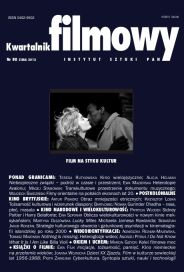Kino wielojęzyczne jako pole komunikacji międzykulturowej.
Polyglot Cinema as a Field of Intercultural Communication.
Author(s): Teresa RutkowskaSubject(s): Theatre, Dance, Performing Arts
Published by: Instytut Sztuki Polskiej Akademii Nauk
Keywords: Polyglot Cinema; transculturalizm
Summary/Abstract: In contemporary reflection on film directed towards the question of globalization, transculturalism and transnationalism of cinema, there exists the theme of polyglot cinema. The language used by film characters is important not only as a marker of ethnic identity and the carrier of meaning that pushes the story along. It is also an element of the character’s identity, social and cultural belonging, with the entire baggage of symbolic meaning. Chris Wahl considers polyglot cinema to be a very specific film genre that belongs together with subgenres such as the episode film, globalization film, immigrant film, colonial film and existential film. He attaches a special meaning to this genre because it refers to both literary and metaphoric meanings of borders and limits in the contemporary world and human communication. Rutkowska refers to these concepts in her analysis of films such as "Contempt" ("Le Mépris", 1963) by Jean-Luc Godard, Sofia Coppola’s "Lost in Translation" (2003), Alejandro González Iñárritu’s "Babel" (2006) or "The Cuckoo" (2002) by Aleksandr Rogozhkin. In her analysis Rutkowska aims to identify important artistic functions of this kind of “confusion of tongues”.
Journal: Kwartalnik Filmowy
- Issue Year: 2012
- Issue No: 80
- Page Range: 6-18
- Page Count: 13
- Language: Polish

